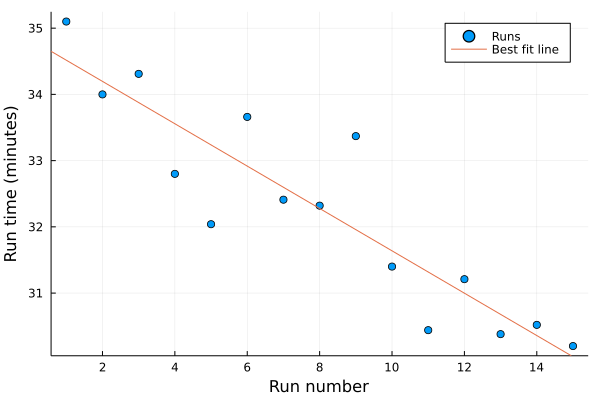Operating on arrays
Introduction to Julia

James Fulton
Climate informatics researcher
Basic array functions
# An array with 6 elements x = ["a", "b", "sea", "d", "e", "f"]# Find the length of the array l = length(x)println(l)
6
Basic array functions
# An array with 6 elements
x = ["a", "b", "sea", "d", "e", "f"]
x_sorted = sort(x)
println(x_sorted)
["a", "b", "d", "e", "f", "sea"]
# An array with 6 elements
x = [100, 95, 9, 22, 75, 58]
x_sorted = sort(x)
println(x_sorted)
[9, 22, 58, 75, 95, 100]
Vectorized operations
# Gradient and intercept m = -0.32 c = 34.8# Next run number is 16 x = 16# Predict next run time y = m * x + cprintln(y)
29.68

Vectorized operations
# Gradient and intercept m = -0.32 c = 34.8 # Next run numbers x = [16, 17, 18, 19, 20]# Predict next run time y = m * x + c
ERROR: MethodError: ...

Array addition
Add scalar
a = [1,2,3]
# Answer we expect is [3,4,5]
println(a .+ 2)
[3, 4, 5]
Add array
a = [1,2,3]
b = [1,2,3]
# Answer we expect is [2,4,6]
println(a .+ b)
[2, 4, 6]
Array addition
Add scalar
a = [1,2,3] # Answer we expect is [3,4,5]println(a + 2)
ERROR: MethodError: ...
Add array
a = [1,2,3] b = [1,2,3] # Answer we expect is [2,4,6]println(a + b)
[2, 4, 6]
Array subtraction
# Subtract scalar
println(a .- 1)
[0, 1, 2]
# Subtract array
println(a .- b)
[0, 0, 0]
# Subtract scalar
println(a - 1)
ERROR: MethodError: ...
# Subtract array
println(a - b)
[0, 0, 0]
Array multiplication
Multiply by scalar
a = [1,2,3]
# Answer we expect is [5,10,15]
println(a .* 5)
[5, 10, 15]
Multiply by array
a = [1,2,3]
b = [1,2,3]
# Answer we expect is [1,4,9]
println(a .* b)
[1, 4, 9]
Array multiplication
Multiply by scalar
a = [1,2,3]
# Answer we expect is [5,10,15]
println(a * 5)
[5, 10, 15]
Multiply by array
a = [1,2,3]
b = [1,2,3]
# Answer we expect is [1,4,9]
println(a * b)
ERROR: MethodError: ...
Array division
# Divide by scalar
println(a ./ 2)
[0.5, 1.0, 1.5]
# Divide by array
println(a ./ b)
[1.0, 1.0, 1.0]
# Divide by scalar
println(a / 2)
[0.5, 1.0, 1.5]
# Divide by array
println(a / b)
0.071 0.142 0.214
0.142 0.285 0.428
0.214 0.428 0.642
Vectorized operations
# Gradient and intercept
m = -0.32
c = 34.8
# Next run numbers
x = [16, 17, 18, 19, 20]
# Predict next run time
y = m * x + c

Vectorized operations
# Gradient and intercept m = -0.32 c = 34.8 # Next run numbers x = [16, 17, 18, 19, 20] # Predict next run time y = m .* x .+ cprintln(y)
[29.68, 29.36, 29.04, 28.72, 28.40]

Cheatsheet
For arrays a and b
| Operation | Scalar example | Array example |
|---|---|---|
| Addition | a .+ 1 |
a .+ b or a + b |
| Subtraction | a .- 1 |
a .- b or a - b |
| Multiplication | 2 .* a or 2 * a |
a .* b |
| Division | a ./ 2 or a / 2 |
a ./ b |
Let's practice!
Introduction to Julia

